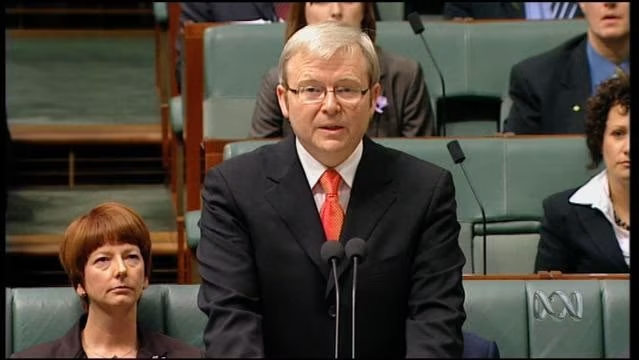The Day/s Australia Said Sorry
On February 13, 2008, Australia did something that countries really don’t do enough of
It apologised, specifically for the government policies that forcibly separated more than 100,000 children from their families for the simple reason they were Aboriginal or Torres Strait Islander.

PM Kevin Rudd’s Apology to the Stolen Generations (2008)
To set the scene February 13 was the first day federal parliament sat that year and the national apology to the “Stolen Generations” was the first item of business for the freshly elected Kevin Rudd.
The apology was actually in response to a report written 11 years earlier, the 1997 Bringing Them Home report which established the suffering and trauma caused by almost a century of state-sanctioned abductions and abuse of Indigenous Australians largely unknown to a wider Australia.
How many times have we said sorry?
BROOKS Cultural Advisor, Mike Butler on The Day/s Australia Said Sorry
In 2001’s British Child Migrants Apology, Howard formally apologised for its role in the scheme that shipped young children from Britain to Australia and into the abuse of institutions or foster care.
Apologies are also a big part of a similarly big word called reconciliation – the process that leads on from apologies,efforts to come to terms with the past, acknowledge harm caused, and work towards a more just and harmonious society.
For the victims of these policies, the mere process of acknowledging harm and hurt, were in many ways life changing. And collectively as a country it did a similar thing – because that’s what saying sorry can do.
Reconciliation is an ongoing process that requires commitment, effort, and dedication from all parties involved. It is a journey towards healing, justice, and a more equitable society, rather than a destination.Our Commitment to ReconciliationIn so many ways reconciliation is at the heart of what engagement professionals do well. Engaging with diverse communities and fostering understanding is central to our work, and we believe that real reconciliation can only happen through active participation and meaningful action.It’s also one of the reasons why BROOKS has worked with Reconciliation Australia for more than five years now to do our part in the nation’s reconciliation with Australia’s Aboriginal and Torres Strait Islander peoples.
Our roadmap for this has been our Reconciliation Action Plan (most commonly known as RAP’s) are an organisational roadmap to improve how we engage as well as contribute to the broader reconciliation movement
In the process BROOKS and our people believe we’ve built better relationships and created opportunities in what’s been a mutually beneficial process for everyone. Why Your Organisation Should Implement a RAPIf your organisation has not yet adopted a Reconciliation Action Plan, we strongly encourage you to consider it. Businesses play a critical role in reconciliation, not just through corporate responsibility but by fostering inclusivity, supporting Indigenous employment, and amplifying First Nations voices.By implementing a RAP, organisations can:Educate employees on the history and culture of First Nations peoples.
Develop meaningful partnerships with Indigenous communities.Create inclusive policies that support Aboriginal and Torres Strait Islander employees and suppliers.Contribute to national reconciliation efforts, making a lasting impact.Moving Forward TogetherReconciliation is not the responsibility of one person, one organisation, or even one government—it is a collective effort that requires commitment from all sectors of society. As former Prime Minister Kevin Rudd said in his 2008 speech:
“We apologise for the laws and policies of successive Parliaments and governments that have inflicted profound grief, suffering, and loss on these our fellow Australians.”
At BROOKS, we believe that acknowledging the past is the first step toward building a more just and inclusive future. We are committed to taking meaningful action through our RAP and encourage others to do the same.Together, we can ensure that reconciliation is not just an aspiration but a reality for all Australians

Mike Butler – 0405 170 778
